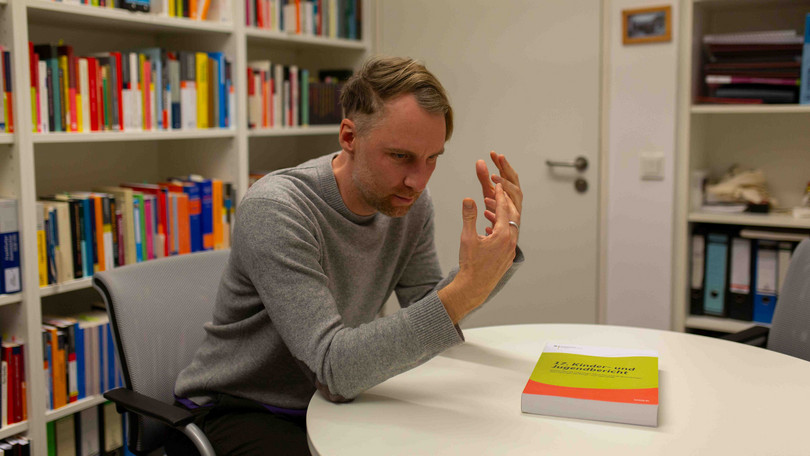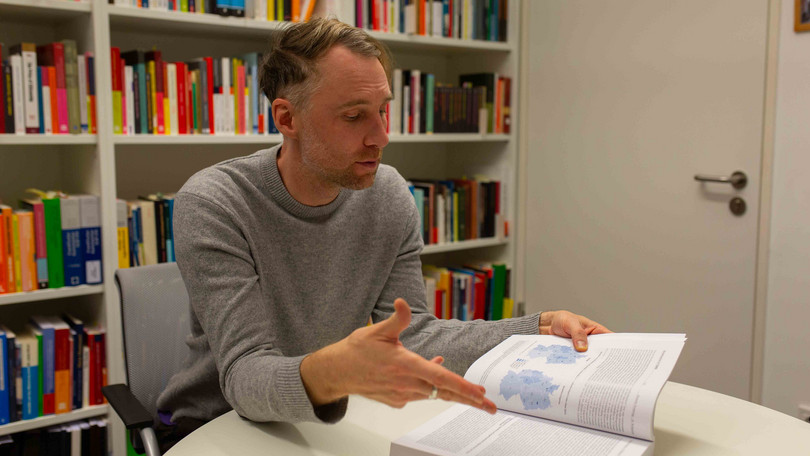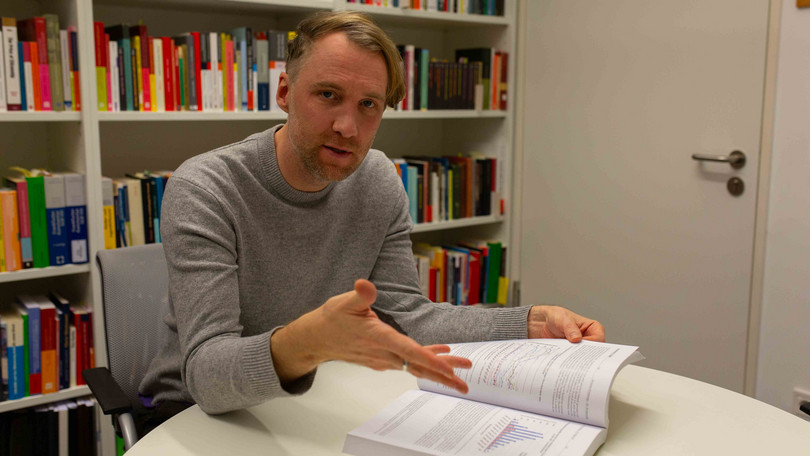Professor Dr Philipp Sandermann Contributes to the Federal Government's Children and Youth Report
2024-11-26 If you are reading this, you were once a child. But how are children and young people faring in 2024 Germany? What challenges do they face, and how can we better support them? Every legislative term, the German federal government publishes the Children and Youth Report to address these questions. Every third edition is a comprehensive report, examining not just a specific issue but the entire body of research on growing up in Germany, alongside the services and programmes available in the field of child and youth welfare. One of the experts contributing to the latest edition is Professor Dr Philipp Sandermann from Leuphana University.
Currently, around 22 million young people—children, adolescents, and young adults—live in Germany. The federal government pays close attention to their situation, acknowledging in a statement from the Ministry for Family Affairs: "The federal government recognises that young people in Germany are growing up in a time of profound and sometimes crisis-ridden change, characterised by uncertainty and significant societal transformation pressures. […] The crises of recent years have left emotional scars on many." The preparation of the 17th Children and Youth Report placed significant emphasis on involving young people. The commission organised participatory workshops with selected groups and a hearing with engaged young individuals to understand their needs, perspectives, and current living conditions. Altogether, 5,381 young people aged five to 27 were involved in discussions on various issues. “No matter how good your intentions are, it’s always different to talk with people rather than just about them,” Sandermann observes.
How Are Children Doing?
The expert panel did not shy away from addressing difficult truths in the report: “Children and young people are acutely aware of today’s multiple crises—war, climate change, threats to democracy. They are sometimes directly affected by these issues and do not take stability and peace for granted. Their needs and rights have been largely overlooked in public discourse and political decision-making, leading many to lose trust in political systems.”
The report highlights how stagnant economic growth, soaring prices, and a spike in inflation have exacerbated social and economic inequalities, disproportionately affecting vulnerable groups and young people. As they rely heavily on societal support, these challenges impact their opportunities and outlook. Feedback cycles of societal crises, democratic disillusionment, and a lack of political inclusion cloud their futures.
The transition of young people into the workforce presents a mixed picture. While some benefit from opportunities created by labour shortages, others struggle with precarious employment. Young people’s expectations for workplaces and employers have also evolved, particularly in terms of work-life balance and career development.
Yet, the authors of the report also reveal a surprising finding: “Despite numerous societal challenges, studies show that young people are largely satisfied with their lives and optimistic about the future. This apparent contradiction reflects a society that has sufficient resources to create equitable opportunities but fails to distribute them effectively.”
What Needs to Change?
Being young in 2024 is no easy feat. The analyses in the 17th Children and Youth Report show that young people are growing up amid rapidly shifting and often crisis-ridden conditions. “People often overlook,” Sandermann explains, “that young people have significantly fewer participatory rights than adults. They need structural conditions that enable an optimistic outlook on the present and future. Reliable people, organisations, and institutions play a central role in this.” He adds that young people and their families often extend trust to others without being certain it will be warranted. “That’s why we need to move beyond a business-as-usual approach when it comes to children and youth.” Drawing on the report’s conclusions, Sandermann proposes several key guidelines for reshaping society’s relationship with its young members: Youth welfare should not be a stopgap for inadequate housing or social policies. Federal states must legally and financially commit to ensuring children grow up free from violence. Policies affecting children must involve children directly, regardless of their gender, sexual orientation, economic status, cultural background, religion, age, or disabilities. Not least are efforts toward climate justice vital, as they offer long-term benefits for today’s youth. “We must enable a better future by creating it in the present,” Sandermann emphasises.
Building Trust
Children, adolescents, and young adults in Germany face complex challenges. Yet, the commission believes that many young people still have “good reasons” to be hopeful. “There are indeed reasons for optimism,” Sandermann says, “but they are distributed very unevenly. I recently attended an event for young people where a well-meaning speaker encouraged them to ‘look to the future with confidence.’ But this sentiment means something entirely different depending on whether you go home to a house with a garden, looking forward to seeing your parents, or to a high-rise, hungry and hoping your parents aren’t there. Not everyone can look forward to growing up or focus on the common good—and structural reasons underlie this disparity.”
Sandermann stresses that addressing these structural issues requires achieving two seemingly contradictory goals: “We need societal stability while fostering openness to new development perspectives.” Trust is central to this effort. “When societal mistrust grows, everything deteriorates—and this mistrust disproportionately affects minorities and already vulnerable groups, including children and young people. Trust is scarce, yet indispensable in times of crisis. It cannot be demanded but must develop through specific situations and as an ongoing process. Young people need people, organisations, and institutions that prove themselves trustworthy.”
The 17th Children and Youth Report was published in September and first discussed with the broader public in November at a conference hosted by the Ministry for Family Affairs and the Child and Youth Welfare Association.
Professor Dr Philipp Sandermann’s research frequently focuses on societal transformation (including migration and integration) and advocacy for particularly vulnerable young people (e.g., through ombudsperson and complaint mechanisms). In recent years, his work has increasingly concentrated on trust, a core theme of the Children and Youth Report. Together with Vanessa Schwenker, he produced the podcast Trust Issues. His textbook Grundkurs Theorien der Sozialen Arbeit (Introductory Course in Social Work Theories) has become a staple of social pedagogy education. Beyond his research, Sandermann is a board member of the Child and Youth Welfare Association and editor of the International Journal of Social Pedagogy.Der 17. Kinder- und Jugendbericht 2024 wurde im September veröffentlicht und im November bei einer Tagung des Familienministeriums und der Arbeitsgemeinschaft für Kinder- und Jugendhilfe erstmals mit der breiteren Öffentlichkeit diskutiert.



